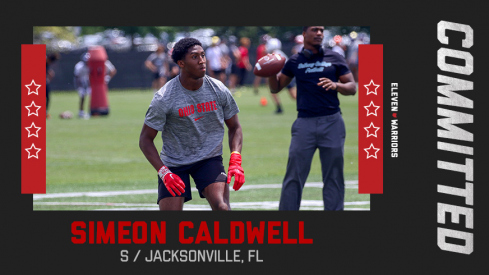Former Santa Clara standout Christoph Tilly, a top-10 center in the transfer portal, commits to Ohio State.
 I still can't believe we scored 73 points here
I still can't believe we scored 73 points hereUrban Meyer's continual haul of elite defensive linemen and other defensive players in his two recruiting classes reinvigorates the seemingly eternal question of whether teams win national championships primarily because of their elite defenses or offenses. In this week's stat session I wanted to take a look at whether the old aphorism that "Offense sells tickets, but defense wins championships" is actually true. I think the majority of Ohio State fans would agree that, based upon our experience with the Tressel-led Silver Bullets of the 2000s, defense does in fact win championships. The common belief is that, save for the 2006 campaign with Ted Ginn and Troy Smith, Ohio State largely rode its defenses to victory year after year.
Now, under the first year of Urban's Eternal Six-Year Reign, this question is all the more important. Urban has brought in an incredible defensive recruiting class while installing a new space-age offense. While it's obvious that teams need to be proficient at both offense and defense in order to win, is one more responsible for championships than the other?
To measure offensive and defensive prowess, I use Football Outsiders' 2011 S&P+ Offensive and Defensive Rankings, which is comprised of three different measures:
1. Success rate, which measures whether any given play was successful. I.e. 50% of necessary yardage on first down, 70% on second down, and 100% on third/fourth.
2. EqPts Per Play: A measure of explosiveness "derived from determining the point value of every yard line (based on the expected number of points an offense could expect to score from that yard line) and, therefore, every play of a given game."
3. Opponent Adjustments: A combination of the first two measures that is compared to expected output based upon their opponents and opponents' opponents. This rewards tougher schedules and punishes weaker ones.
Any measure of offenses and defenses will be most valid when a game is still competitive, operationalized here as "a game within 24 points in the first quarter, with 21 points in the second quarter, and within 16 points in the second half." This controls for when teams ease off the gas pedal when victory was assured. It also ensures that Bielma's teams don't get extra points for pummeling Indiana in games that get out of hand.
I then looked at how these measures of offensive and defensive strength were related to overall season success. I use two measures here: number of AP votes at the end of the year and total wins minus losses. I like the number of AP votes measure because it provides more information than a team's final ordinal ranking. For instance, Alabama wasn't better than LSU by the same amount that LSU was better than Oklahoma St. This measure should have perceptions about margin of victory and strength of schedule built in too. Finally, I controlled for strength of schedule directly.
Here are my results:
| Ap Votes | Coefficient | Std. Err | T | P>T | 95% Confidence int |
|---|---|---|---|---|---|
| Off S&P+ | 16.262 | 4.087 | 3.98 | .001 | 7.76 - 24.76 |
| Def S&P+ | 4.8468 | 3.357 | 1.44 | .164 | -2.13 - 11.82 |
| SoS | 22.778 | 10.861 | 2.1 | .048 | .191 - 45.36 |
| Wins - losses | Coefficient | Std. err | t | p>t | 95% Confidence int |
|---|---|---|---|---|---|
| Off S&P+ | .07848 | .0242 | 3.24 | .004 | .028 - .128 |
| Def S&P+ | .04050 | .0198 | 2.04 | .055 | -.000 - .081 |
| SoS | -.02384 | .0643 | -.37 | .715 | -.157 - .110 |
A couple of things are readily apparent when comparing these two tables. First, an elite offense seemed to be more correlated with season success than defense during the 2011 season. Offensive S&P+ is statistically significant for both measures of season success, while defensive S&P+ ranking does not meet statistical signifcance at a 95% confidence level. Essentially, for each one unit increase in offensive S&P+, there is an average of 16 additional AP votes, compared to ~5 votes for a one unit increase in defensive S&P+ ranking.
 Can the 2012 Buckeyes ride their offense to success?
Can the 2012 Buckeyes ride their offense to success? There does seem to be some validity to the "offense sells tickets" part of the aphorism. AP voters appear to be impressed with offensive success more than defensive success. This is also reflected in the apparent need for some teams to run up the score for "style points" in the eyes of voters.
I think another part of this is simply because of the relative power disparity between teams in the top-25 during the 2011 season. Alabama and LSU had ELITE defenses at the very top, but the other top teams won because of their offenses - look at Oregon, Arkansas, and Oklahoma State as key examples. All had adequate to good defenses, but were clearly built around their explosive offenses. A team's conference also plays some role here. Both LSU and Alabama are in the same conference division - because of the high defensive parity between the two, one team had to seperate itself offensively in order to even win the divison, then the MNC.
Strength of schedule is statistically significant for AP voters, but not for our measure of wins minus losses. Clearly voters are more impressed by tough schedules and vote accordingly. It is also important to mention that strength of schedule is partly captured by the S&P+ ranking.
In conclusion, both offense and defense are clearly important to winning games, but voters rate amazing offenses higher than amazing defenses. It's entirely possible that this is just a statistical artifact of a single year - we just looked at the 2011-12 season, which could have been an outlier. It's important to recognize that these results are preliminary and I'd be uncomfortable generalizing across all years. I will mention, however, that it is likely that a test of the 2010 season would offer similar results - Auburn certainly didn't win the championship based upon its stellar defense, but on the back of Cam Newton and Gus Malzahn's offense.
Tune in again next week when I'll be comparing Tressel and Meyer's recent offenses and defenses to see how each coach achieved consistent success.
TL;DR It appears as though success was correlated with a strong offense more than a strong defense during the 2011 season. That is certainly not to say that defense is unimportant. Further, this may be unique to the 2011 season, but interesting nonetheless.

